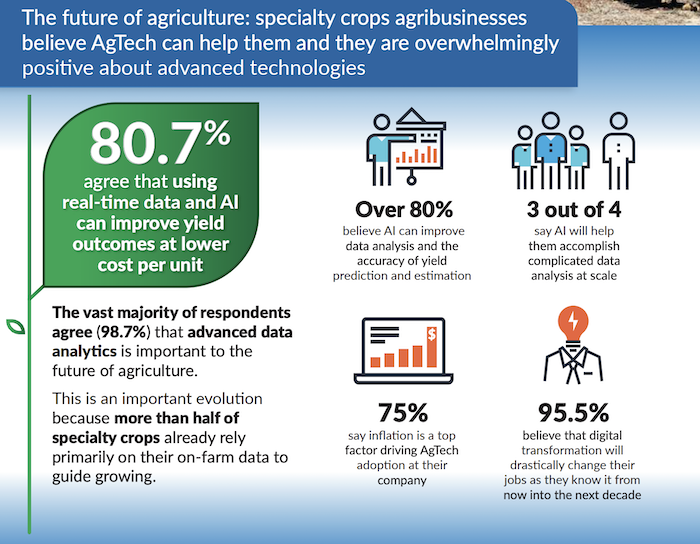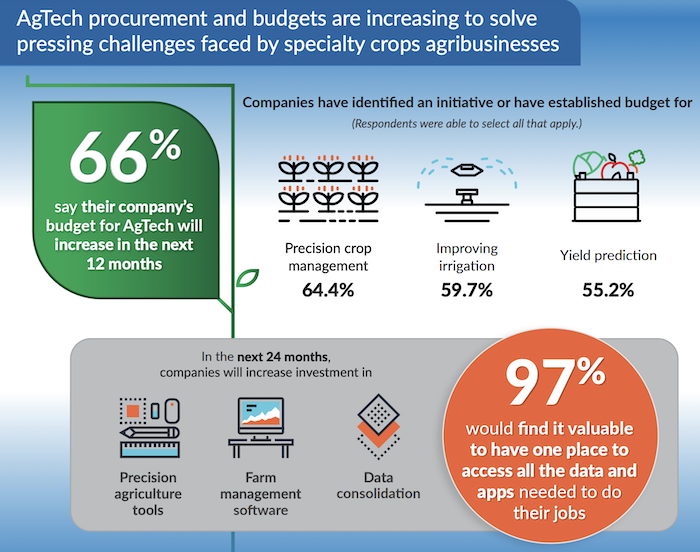The results of the search for AgTech Trends 2023 The survey reveals that while there has been a significant increase in digital transformation initiatives across food and beverage companies, many still struggle to derive actionable insights from their data. The majority of food and beverage businesses face on-farm and off-farm challenges resulting from inaccurate yield forecasts and inconsistencies due to the complexity of data collection and analysis. Respondents reported a strong need and desire for advancements in digital technology, including AI and automation, to support more accurate, data-driven decision-making across the value chain agri-food.
Feedback from 807 U.S.-based food and beverage workers, including executive decision-makers, farm managers, agronomists, data scientists, IT specialists, and marketing professionals, offers a comprehensive overview of the current state and future trajectory of the food and beverage industry.
Key findings include:
- Anticipate the AI revolution: Nine out of ten respondents see artificial intelligence (AI) and data analytics as crucial transformative forces for their future, anticipating substantial changes in agricultural jobs over the next five years.
- Challenges related to using data: An overwhelming 92% of respondents struggle to improve on-farm operations using the current data available to them.
- The path to precision is through automation and AI: More than half of respondents plan to increase their investments in on-farm robotics or autonomous systems over the next 24 months, in the field (54.8%), for harvest (60.5%) and for packaging (51.3%). Additionally, more than three-quarters of food and beverage professionals (76.7%) believe that given the amount of data their organization must analyze, AI can improve data analysis and accuracy. forecasting and estimating yield.
- AgTech investment on the rise, investing in the future: In the coming year, 60% of food and beverage companies plan to increase their AgTech budget. Their top purchasing priorities are precision agriculture tools (66%), farm management software (60%), and data consolidation (45%). The three main areas of investment in specialty crops are precision agriculture tools, farm management software and data consolidation.
- A call for unified data platforms: A significant 96% of respondents expressed the need for a consolidated platform to access data and applications critical to their operations from various vendors.
- Impact of extreme weather conditions: Unpredictable weather, driven largely by climate change, is a major concern, with 76% of food and beverage companies identifying it as one of the top stressors, highlighting broader concerns about the impact of climate change on businesses. yields.
This industry-independent research delves into the challenges and opportunities facing food and beverage companies around data quality, yield forecast accuracy, ROI, benefits and the potential of AgTech solutions to transform the agricultural sector. The Yield sponsored the survey to validate the need for its precision yield management solution for specialty crops.
The industry is optimistic that consistent data collection, predictive analytics, AI and precision farming tools will increase profitability amid climate unpredictability and rising costs.
The study highlights the urgency of establishing consistency in data collection and interpretation. Obstacles including labor shortages, rising costs, supply chain inconsistencies and the effects of climate change have pushed teams to seek more accurate predictions of future crop yields.
Climate change and its ramifications remain a major concern, with 81.7% of respondents worried about its future implications on agricultural yields. Even with data from established sources like NOAA, confidence in weather forecasts remains low. Improved and accurate weather forecasting is emerging as a potential solution, with many seeing it as a way to improve crop quality and reduce weather-related risks.
The positive side lies in the optimism of the sector. A large majority believe that AI and predictive analytics can refine their data analysis processes, producing better and more profitable results. Additionally, there is a strong and growing inclination towards agricultural technologies, with industry professionals predicting significant improvements in on-farm and off-farm processes through AgTech.
Interestingly, despite current challenges, respondents shared a clear positive disposition toward digital tools to understand their data and automation to collect data more accurately at scale. This is evident from notable increases in budget allocations for precision agricultural tools and a forward-looking approach to on-farm robotics and autonomous systems.
Food and beverage companies have also recognized barriers to the adoption of digital technology, such as connectivity issues, budget constraints and a general skepticism of AI-generated forecasts. However, external pressures, including inflation and supply chain inconsistencies, act as catalysts pushing them to adopt AgTech.
Ros Harvey, Founder and CEO of The Yield, observed: “Despite growing interest and adoption of digital transformation initiatives, many food and beverage companies today struggle to achieve accurate yield forecasts. The biggest challenge is to effectively leverage the available data. As the AgTech Trends 2023 study reveals, there is a palpable need to improve consistency across data collection and interpretation methods, especially as companies aim for higher returns at lower costs. As businesses navigate the complexities of data management, digital transformation is emerging as the beacon of a more efficient, accurate and sustainable future. Our Precision Yield Management platform provides AI-driven on-farm recommendations and yield forecasting across the value chain to improve profitability and sustainability.
Other notable findings from the survey
Data collection challenges: While nearly 80% of companies are at the “data mining” stage or beyond, only 21.3% have fully automated their data collection processes. The remaining majority still rely on traditional means such as machines, field applications and sensors.
The consequence? An overwhelming 73.5% of businesses spend 11 hours or more per week just on data collection, consolidation, and analysis. More than a quarter (26.4%) spend more than 16 hours per week on it.
The power of accurate predictions: The survey highlights the importance given by agri-food companies to accurate yield forecasts. Such forecasts are essential not only for on-farm decisions, but also play a central role in logistics, distribution, post-harvest processing and obtaining the best prices.
Given the current state of data, inaccurate forecasts pose significant risks throughout the supply chain.
The impact of weather unpredictability: Nearly 90.2% of food companies recognize that climate change affects their crop yields, and 36.7% of them observe that it makes yields very unpredictable.
The need for better and more accurate weather forecasts is evident, with nearly 80% of specialty crop respondents believing better forecasts would improve crop quality.
Obstacles and factors favoring the adoption of AgTech: Several barriers to AgTech adoption persist, including connectivity issues, distrust of digital technology, and budgetary constraints. However, the urgency of various macroeconomic and environmental factors, such as inflation, potential recessions, and supply chain inconsistencies, are pushing food and beverage companies toward more aggressive adoption of AgTech.
Notably, nearly 60.5% of respondents cited labor shortages, adding to the urgency.
A glimpse of the future: The conclusions of the AgTech Trends 2023 research conveys a technologically positive mindset. Agribusinesses hope that converging their various data sources onto a unified platform and adopting modern technologies like AI will not only simplify data interpretation, but revolutionize agriculture itself.
Learn more
For more details or to request a full copy of the AgTech Trends 2023 investigation report, go to: https://www.theyield.com/resources/




Related content:


